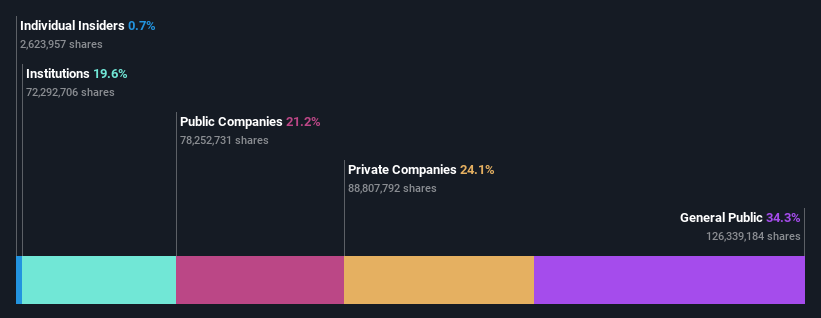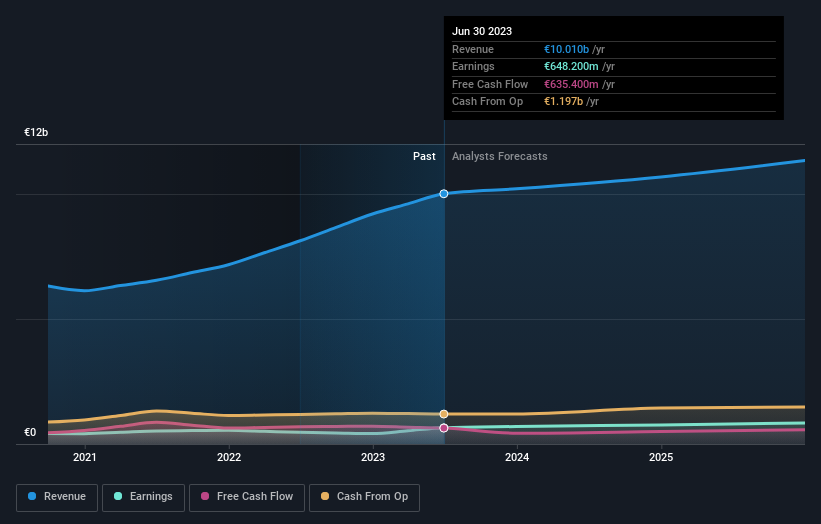Retail investors account for 34% of Coca-Cola HBC AG's (LON:CCH) ownership, while private companies account for 24%
Key Insights
Significant control over Coca-Cola HBC by retail investors implies that the general public has more power to influence management and governance-related decisions
A total of 5 investors have a majority stake in the company with 51% ownership
A look at the shareholders of Coca-Cola HBC AG (LON:CCH) can tell us which group is most powerful. We can see that retail investors own the lion's share in the company with 34% ownership. In other words, the group stands to gain the most (or lose the most) from their investment into the company.
Private companies, on the other hand, account for 24% of the company's stockholders.
Let's take a closer look to see what the different types of shareholders can tell us about Coca-Cola HBC.
See our latest analysis for Coca-Cola HBC
What Does The Institutional Ownership Tell Us About Coca-Cola HBC?
Institutions typically measure themselves against a benchmark when reporting to their own investors, so they often become more enthusiastic about a stock once it's included in a major index. We would expect most companies to have some institutions on the register, especially if they are growing.
We can see that Coca-Cola HBC does have institutional investors; and they hold a good portion of the company's stock. This implies the analysts working for those institutions have looked at the stock and they like it. But just like anyone else, they could be wrong. If multiple institutions change their view on a stock at the same time, you could see the share price drop fast. It's therefore worth looking at Coca-Cola HBC's earnings history below. Of course, the future is what really matters.
We note that hedge funds don't have a meaningful investment in Coca-Cola HBC. The company's largest shareholder is Boval S.A., with ownership of 23%. For context, the second largest shareholder holds about 21% of the shares outstanding, followed by an ownership of 2.6% by the third-largest shareholder.
Our research also brought to light the fact that roughly 51% of the company is controlled by the top 5 shareholders suggesting that these owners wield significant influence on the business.
While studying institutional ownership for a company can add value to your research, it is also a good practice to research analyst recommendations to get a deeper understand of a stock's expected performance. Quite a few analysts cover the stock, so you could look into forecast growth quite easily.
Insider Ownership Of Coca-Cola HBC
While the precise definition of an insider can be subjective, almost everyone considers board members to be insiders. Management ultimately answers to the board. However, it is not uncommon for managers to be executive board members, especially if they are a founder or the CEO.
Insider ownership is positive when it signals leadership are thinking like the true owners of the company. However, high insider ownership can also give immense power to a small group within the company. This can be negative in some circumstances.
Our information suggests that Coca-Cola HBC AG insiders own under 1% of the company. We do note, however, it is possible insiders have an indirect interest through a private company or other corporate structure. Being so large, we would not expect insiders to own a large proportion of the stock. Collectively, they own UK£56m of stock. It is always good to see at least some insider ownership, but it might be worth checking if those insiders have been selling.
General Public Ownership
With a 34% ownership, the general public, mostly comprising of individual investors, have some degree of sway over Coca-Cola HBC. While this group can't necessarily call the shots, it can certainly have a real influence on how the company is run.
Private Company Ownership
It seems that Private Companies own 24%, of the Coca-Cola HBC stock. It might be worth looking deeper into this. If related parties, such as insiders, have an interest in one of these private companies, that should be disclosed in the annual report. Private companies may also have a strategic interest in the company.
Public Company Ownership
Public companies currently own 21% of Coca-Cola HBC stock. We can't be certain but it is quite possible this is a strategic stake. The businesses may be similar, or work together.
Next Steps:
It's always worth thinking about the different groups who own shares in a company. But to understand Coca-Cola HBC better, we need to consider many other factors. Case in point: We've spotted 1 warning sign for Coca-Cola HBC you should be aware of.
But ultimately it is the future, not the past, that will determine how well the owners of this business will do. Therefore we think it advisable to take a look at this free report showing whether analysts are predicting a brighter future.
NB: Figures in this article are calculated using data from the last twelve months, which refer to the 12-month period ending on the last date of the month the financial statement is dated. This may not be consistent with full year annual report figures.
Have feedback on this article? Concerned about the content? Get in touch with us directly. Alternatively, email editorial-team (at) simplywallst.com.
This article by Simply Wall St is general in nature. We provide commentary based on historical data and analyst forecasts only using an unbiased methodology and our articles are not intended to be financial advice. It does not constitute a recommendation to buy or sell any stock, and does not take account of your objectives, or your financial situation. We aim to bring you long-term focused analysis driven by fundamental data. Note that our analysis may not factor in the latest price-sensitive company announcements or qualitative material. Simply Wall St has no position in any stocks mentioned.


